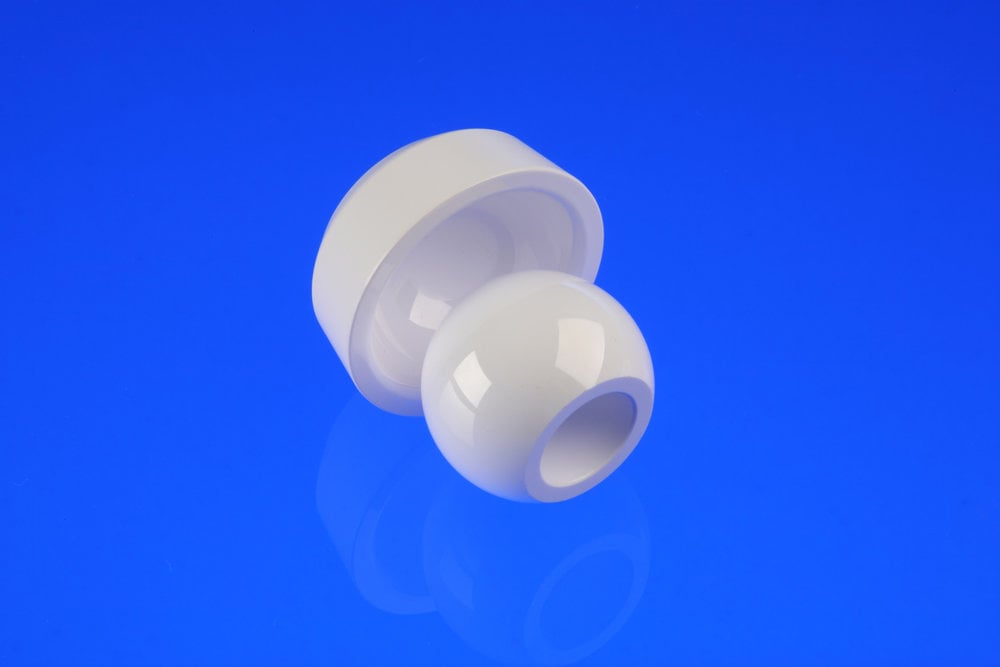www.magazine-industry-usa.com
22
'12
Written on Modified on
Morgan Technical Ceramics’ bioceramic hip joints improve quality of life for patients
Vitox® AMC, an alumina matrix composite bioceramic material for hip joints from leading manufacturer of ceramic components, Morgan Technical Ceramics, is proven to have exceptionally low wear rates compared with alternative materials. This provides a reliable solution without the potential health risks associated with metal hip joints, whilst being longer lasting, and enabling patients to continue to lead active lifestyles.

‘Comparative ageing behavior of commercial, unworn and worn Y-TZP and zirconia-toughened alumina hip joint heads’ and ‘Wear performance of advanced new generation ceramics: zirconia, alumina and zirconia toughened alumina applied in hard-on-soft and hard-on-hard hip prostheses’.
Morgan Technical Ceramics works with universities worldwide and has been supplying the global medical industry with ceramic components for more than 25 years.
In the study with Durham University, a polyethylene UHMWPE cup loaded against the Zirconia-based heads produced the wear rate of 0.9307 mm3/106 cycles. However, comparatively there was considerable wear reduction for full ceramic couples. The steady-state wear rate was 0.0053 ± 0.0032 mm3/106 cycles (mean ± SD) for Vitox® AMC cups.
The studies also highlight that Vitox® AMC has shown an outstanding ageing stability with no sign of degradation over a period longer than human life.
“Our aim was to find a way to combine high wear resistance, excellent mechanical properties and long term stability into a single bioceramic that would also improve comfort and quality of life for patients,” says Yannick Galais, commercial manager at Morgan Technical Ceramics.
“I’m delighted that these reports demonstrate that our Vitox® AMC bioceramic really is harder wearing and lasts longer than alternatives.”
The report is available online at:
http://www.sciencedirect.com/science/article/pii/S0955221912000179
Vitox® AMC is a high purity, sub-micron grain alumina matrix composite offering a 55% increase in 4-point flexural strength and a 12.5% increase in fracture toughness compared to high purity implantable grade alumina. Materials specialists within Morgan Technical Ceramics have formulated the composite material with the intention that the mechanical properties of alumina can be enhanced.
The Vitox® AMC high strength and mechanical properties offer a wide range of design possibilities.
The composite material can be used to manufacture larger diameter femoral heads and thin wall section acetabular cups which are proven to reduce the likelihood of dislocation by providing a more stable joint, which can be a problem in patients who have undergone total hip replacement arthroplasty surgery. Larger bioceramic hip joints similar in diameter to natural bone feature, give recipients a wider range of motion without the potential for dislocation, improving quality of life.
Vitox® AMC can also be used for a new form of arthroplasty which has been developed for bone preservation. The new products are designed for minimal invasive procedure, require intricate shapes and thin wall sections and are designed for easier revision surgery for a subsequent total hip replacement device.
Vitox® AMC can be used in ceramic-on-ceramic systems or in conjunction with a polyethylene and metal acetabular cup in hip replacements. Metal is still widely used in hip joints, however, recent reports have shown there to be potentially serious health risks caused by tiny metal ions can break off from the implants and leak into the blood, causing local reactions that destroy muscle and bone, cause severe pain and even long-term disability. Traditional metal–polyethylene hip implant wear also generates polyethylene particulate debris, inducing osteolysis, which can lead to the weakening of surrounding bone resulting in loosening of the implant, a primary cause of costly revision operations.
Vitox® AMC was developed at Morgan Technical Ceramics’ facility in Rugby, UK, which is certified with the ISO13458 standard for the design and manufacture of medical devices.

